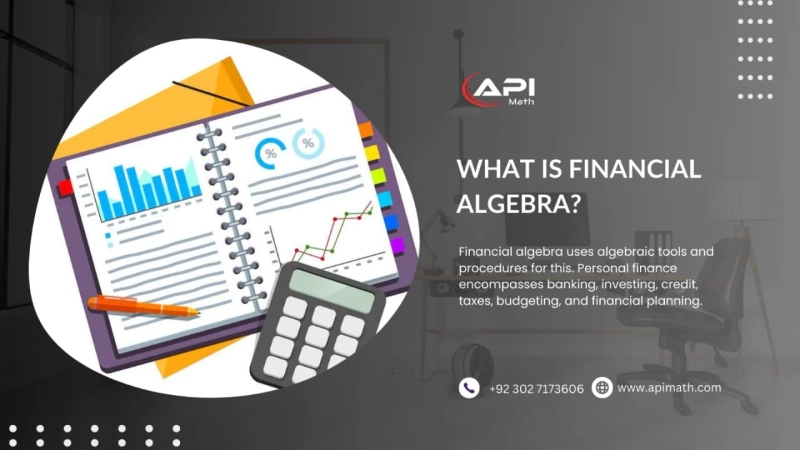Table of Contents
Introduction:1. What is Financial Algebra?2. Curriculum and Topics Covered:3. Relationship between Financial Algebra and Algebra 2:4. Applications in Finance:5. Educational Relevance:6. The Aim of Financial Mathematics:7. Formulas in Financial Mathematics:8. Topics in Financial Mathematics:9. Father of Financial Mathematics:Conclusion:FAQs: Financial Algebra1. What is financial algebra?2. What do you learn in financial algebra?3. Is financial algebra the same as Algebra 2?4. Is algebra used in finance?5. Is financial algebra a math class?6. What is the aim of financial mathematics?7. What is the formula for financial math?8. What are the topics in financial mathematics?9. Who is the father of financial mathematics?10. What is advanced algebra with financial applications?11. Financial algebra, what is it?12. What grade is financial algebra?13. What is advanced financial algebra?14. Is financial algebra hard?15. Is there a Financial Algebra PDF?Post By: API MATHIntroduction:
Financial algebra is multidisciplinary since it combines math, especially algebra, with finance. It gives people the basic math skills needed to understand and solve finance problems. This article “what is financial algebra? “ Defines financial algebra, discusses its curriculum, applications, and importance in many educational and professional settings.
1. What is Financial Algebra?
Financial algebra uses algebraic tools and procedures for this. Personal finance encompasses banking, investing, credit, taxes, budgeting, and financial planning. Financial algebra uses mathematical models and formulas to help people make smart financial decisions.
ARE YOU INTERESTSD IN MATHEMATICS?
2. Curriculum and Topics Covered:
In financial algebra courses, students typically build upon their foundational knowledge of algebra and extend it to financial contexts. The curriculum may vary depending on the educational institution or program, but common topics include:
a) Money Management: Budgeting, banking services, credit, insurance, and taxes.
b) Earning an Income: Wages, salaries, commissions, and deductions.
c) Financial Analysis: Interest rates, loans, investments, and retirement planning.
d) Statistics and Probability: Analyzing financial data and making predictions.
e) Algebraic Modeling: Creating mathematical models to represent financial situations.
f) Data Analysis: Interpretation of financial graphs, charts, and tables.
3. Relationship between Financial Algebra and Algebra 2:
Financial algebra builds on Algebra 2, but it’s different. Algebra 2 introduces increasingly complicated algebraic principles to prepare pupils for higher-level math’s. Financial algebra solves finance-related problems using algebraic methods.
Here API MATH make math Easy For You
4. Applications in Finance:
The financial industry finds several uses for financial algebra. Bankers, investors, financial planners, and accountants employ algebraic models and formulae to analyze financial data, predict trends, and make good decisions. Financial algebra helps one compute interest rates, appraise investments, and manage funds.
5. Educational Relevance:
High schools frequently include or provide electives in financial algebra as part of their mathematics curriculum. It helps pupils build analytical thinking skills while also preparing them for future financial responsibilities. While most schools only cover financial algebra at the high school level, some colleges and institutions may provide more advanced coursework in finance-related mathematics.
6. The Aim of Financial Mathematics:
Similar to financial algebra, the field of financial mathematics seeks to create mathematical models and strategies for analyzing financial markets, handling risks, and making the most prudent financial decisions possible. Calculus, probability, statistics, and optimization are just some of the mathematical ideas that are brought together in this approach to solving tough economic issues. The ultimate objective is to supply quantitative tools that aid in the navigation of financial systems for both individuals and businesses.
7. Formulas in Financial Mathematics:
Financial mathematics employs a wide range of formulas to address specific financial scenarios. Common formulas include:
a) Compound Interest: A = P(1 + r/n)^(nt),
where A is the future value
P is the principal
r is the annual interest rate
n is the number of compounding periods per year
t is the time in years.
b) Present Value: P = A/(1 + r/n)^(nt)
where P is the present value.
c) Loan Payments: PMT = (r * PV) / (1 – (1 + r)^(-n))
PMT is the periodic payment.
r is the interest rate per period
PV is the present value.
n is the number of periods.
8. Topics in Financial Mathematics:
Financial mathematics covers a broad range of topics, including:
a) Time Value of Money
b) Risk Management and Insurance
c) Option Pricing and Derivatives
e) Financial Modeling and Simulation
f) Stochastic Processes
g) Actuarial Mathematics
9. Father of Financial Mathematics:
The field of financial mathematics does not have a single “father” but rather draws on contributions from several notable mathematicians and economists. Some influential figures in the development of financial mathematics include Louis Bachelier, Robert C. Merton, Fischer Black, and Myron Scholes.
Conclusion:
Financial algebra helps students make smart financial decisions by connecting math and finance. Algebraic concepts and real-world financial scenarios help users budget, analyze investments, and prepare for the future. Understanding financial algebra equips individuals with essential tools for navigating the complexities of finance in both personal and professional contexts.
FAQs: Financial Algebra
1. What is financial algebra?
Financial algebra is the application of algebraic concepts and techniques to solve financial problems, such as managing personal finances, making investment decisions, and analyzing financial data.
2. What do you learn in financial algebra?
In financial algebra, you learn topics such as budgeting, banking services, credit evaluation, interest rates, loans, investments, retirement planning, and interpreting financial data.
3. Is financial algebra the same as Algebra 2?
Financial algebra and Algebra 2 are related but different courses. Algebra 2 focuses on abstract algebraic concepts, while financial algebra specifically applies algebraic techniques to financial scenarios.
4. Is algebra used in finance?
Yes, algebra is widely used in finance. It helps in calculating interest rates, solving equations related to loans and investments, analyzing financial data, and developing financial models.
5. Is financial algebra a math class?
Yes, financial algebra is a math class that applies mathematical principles and formulas to real-world financial situations.
6. What is the aim of financial mathematics?
The aim of financial mathematics is to develop mathematical models and techniques for analyzing financial markets, managing risks, and making optimal financial decisions.
7. What is the formula for financial math?
Financial math uses various formulas depending on the specific financial scenario. Common formulas include those for compound interest, present value, loan payments, and others specific to financial calculations.
8. What are the topics in financial mathematics?
Topics in financial mathematics include time value of money, risk management, option pricing, portfolio optimization, financial modeling, stochastic processes, and actuarial mathematics.
9. Who is the father of financial mathematics?
Financial mathematics does not have a single “father.” It draws on contributions from several notable mathematicians and economists, including Louis Bachelier, Robert C. Merton, Fischer Black, and Myron Scholes.
10. What is advanced algebra with financial applications?
Advanced algebra with financial applications refers to the study of algebraic concepts and techniques, building upon foundational algebra, and applying them to solve complex financial problems.
11. Financial algebra, what is it?
Financial algebra is the application of algebraic principles and techniques to analyze and solve financial problems, providing individuals with skills to make informed financial decisions.
12. What grade is financial algebra?
Financial algebra is often introduced to students as an elective or required course during their time in high school.
13. What is advanced financial algebra?
Advanced financial algebra refers to the application of advanced algebraic concepts and techniques to solve more complex financial problems.
14. Is financial algebra hard?
The difficulty of financial algebra can vary depending on individual strengths and mathematical aptitude. However, with proper study and practice, most students can grasp the concepts and excel in the subject.
15. Is there a Financial Algebra PDF?
Financial algebra resources, including PDFs, can be found online and in educational materials. Searching for “Financial Algebra PDF” can provide access to relevant resources.



